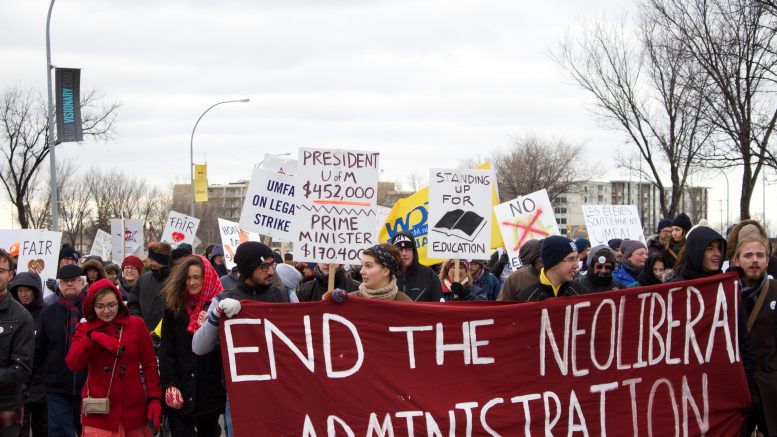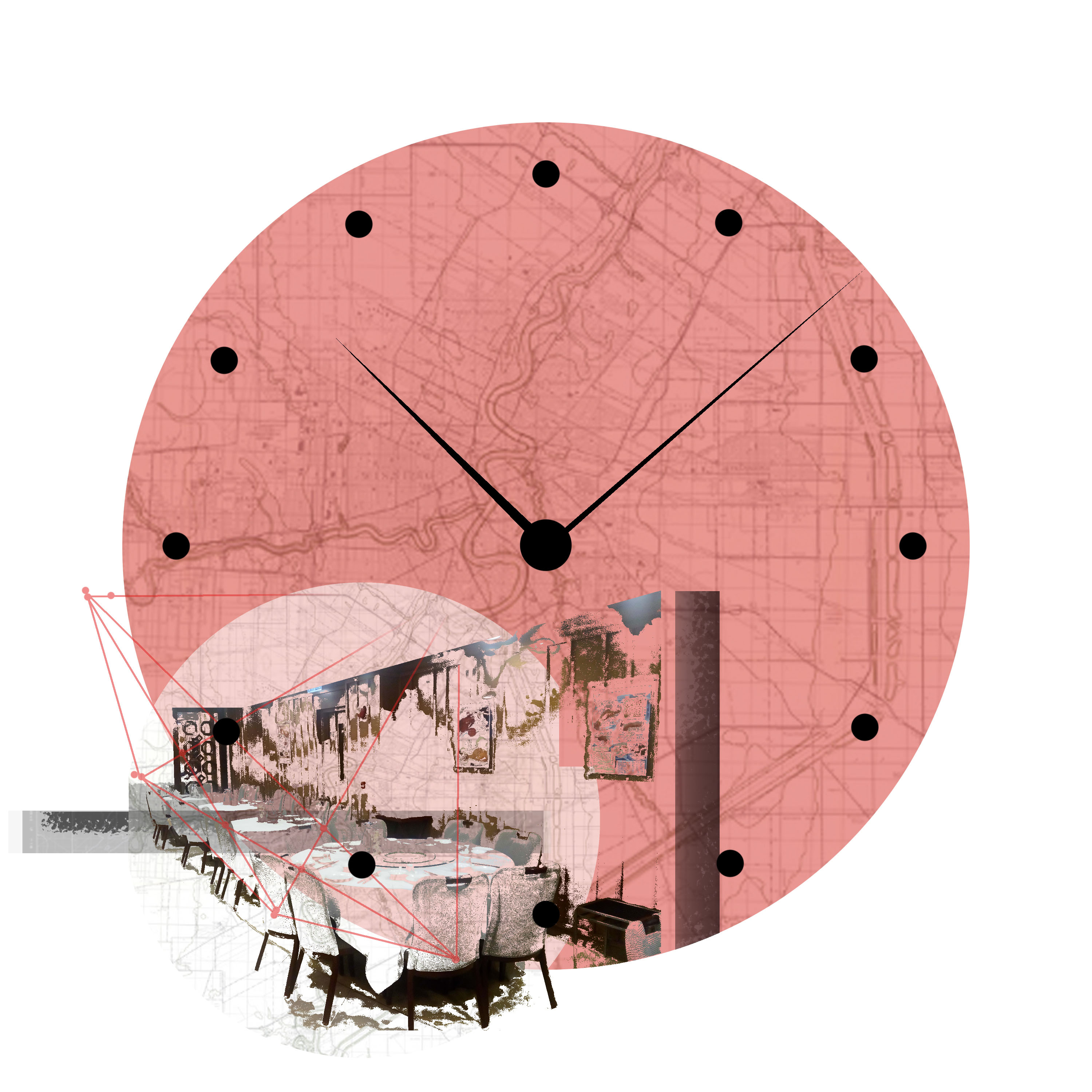As one of us wrote in these pages a few weeks ago, the recent University of Manitoba Faculty Association (UMFA) strike stood to win historically significant gains in the ongoing battle against the commodification and corporatization of education. Sensing this, faculty unions across the country and around the world were watching us, sending us funds and messages of support. However, the strike settlement we ratified on Nov. 21 shows that we have squandered that opportunity. Understanding this in a clear-eyed fashion – and discussing the implications – is critical since we must struggle for these goals in the structures of university governance in coming rounds of bargaining and in the overall battle for public legitimacy.
The following reflections seek to contribute to these processes. They are based on the information about the settlement made available to UMFA members on the night of Nov. 21, when the union membership voted to accept a new collective agreement.
The key goals of the strike – job security for instructors and academic librarians, protection against arbitrary use of performance indicators, and top-down increases in workload – were not attained. The settlement, we believe, leaves us in a situation where, in the place of clear rules and regulations that are written into the contract, administration and faculty will be locked in exhausting rounds of individual battles on everything from workload to performance metrics to collegiality. For this, of course, the administration and the corporate model it has been trying to impose bear primary responsibility. But UMFA could have brought matters to a more decisive end by standing firm in this “battle for the soul of the university,” as our colleague Arthur Schafer dubbed the strike, by better using the opportunity its strength provided.
We had cast the strongest vote ever in UMFA history to strike. That was, in turn, the result of a groundswell of revulsion among faculty at fast-deteriorating conditions on many fronts. Workloads were increasing in a multitude of ways. Collegial governance was being more and more openly violated, such as when the workload of arts faculty instructors was unilaterally raised; spending priorities were diverging ever more from the university’s goal of public higher education; the threat of the use of performance metrics without the consent of faculty members concerned was looming; numerous library assistants had been summarily sacked, leaving academic librarians without much-needed support; and the number of instructors with heavy workloads and without job security was increasing.
UMFA members made their views on these and other issues known in a survey conducted before the bargaining process began and they formed the basis of bargaining. With this firm bedrock of spontaneous opposition to the administration’s actions, strike compliance was, unsurprisingly, impressive.
Moreover, we had student support of a nature and scale that was historically unprecedented. The wider public too, already wary of neoliberal discourse and concerned about the quality of higher education for their children, was more sympathetic than during previous strikes. Our strike’s legitimacy only grew when we shelved the matter of money for this round of bargaining, not because we were not concerned about our pay but because we felt it was more important to halt the commercialization and corporatization of higher education which was eroding the quality of education that we provide to our graduate and undergraduate students and, if possible, reverse the trend.
The weekend before we settled, though we had been on strike for nearly three weeks, spirits on the picket lines were as high as ever. We had known from the start that it would take time for the administration to register the strength of feeling on the picket lines and we were prepared to wait. On Nov. 17, the Thursday before we settled, an UMFA members’ meeting – called because so many of our members wanted to speak to each other and their leadership – packed Knox United Church. One after another, members expressed continuing support for our principles and their determination to make solid gains. No one mentioned ending the strike; it was almost an hour and a half before anyone mentioned money, and then only to seek certain clarifications. The following day witnessed the most massive show of student support for faculty the U of M has ever known.
After those two events, we knew that developments that weekend could be decisive: surely these shows of strength would finally knock some sense into the administration and budge it from the unreasonable, and frankly, from what we could tell, incoherent positions it was taking. We were hardly unaware that strikes never win everything and that we would have to steel ourselves for some disappointments.
What we did not expect, however, was the settlement we got, particularly with so much wind still in our sails.
The UMFA leadership is, unsurprisingly, caught in a deep ambivalence, calling the settlement a “fair deal” and inviting us to celebrate “success” while saying the same goals we were fighting for remain to be fought for.
Let us make a more systematic inventory of the settlement, taking the three major issues first. Certainly, everyone agrees that the settlement’s biggest failure was not winning job security for instructors and academic librarians. However, the seriousness of this failure is worth pausing over. Instructors and librarians, who constitute between 10 and 15 per cent of our membership, wanted this above all else. Solidarity is the most fundamental value of the union movement – but what solidarity can we boast of if we fail to protect our weakest members? Few would blame them from asking whether UMFA membership is worth it anymore. Moreover, this failure weakens UMFA by creating a space in which future management could divide and isolate us. The only secure defence against such tactics is the solidarity of a united workforce, which has been undermined by the settlement.
What UMFA “won” was a commitment from the administration that “there will be no layoffs of academic librarians or instructors” until the end of 2018. As if to add insult to injury, one instructor, who spoke at the ratification meeting of the 700-plus students he would be facing later that week, was told from the platform that he need not fear a layoff: since he taught so many students, he was a “gold mine” to the university.
This response highlights the larger failure. The administration’s drive toward commodifying and corporatizing higher education relies on the progressive elimination of faculty members with the standard 40-40-20 contract (40 per cent teaching, 40 per cent research and 20 per cent service) which expects, and pays, faculty members to devote equal time to teaching and research, ensuring that the latter keeps the former on the cutting edge of their field. Such positions are to be replaced by faculty members who are paid as little as possible in jobs with as little security as possible, to teach as much as possible. They are not to be paid to do research at all. This is why instructors’ job security was such a bone of contention.
The administration would like to turn the overwhelming majority of faculty positions into something like this. We, while understanding that some instructor positions are necessary, are determined to ensure that the norm remains the 40-40-20 contract and that those instructors who wish to pursue research have positions from which to do this.
One of our gains in this strike settlement is the renewal of a letter of understanding between UMFA and the administration that guarantees that the number of UMFA members at the university will not fall below a certain minimum. However, this is no protection against the trend toward eliminating research faculty: it does not specify how many of them will be instructors, paid only to teach and do service, and does not prevent such faculty from becoming a majority.
UMFA needed the victory on instructors’ job security as a first step toward ensuring against this. This would have to be followed by action to better the terms on which sessionals – who have an even worse deal than instructors and are more numerous – are hired as part of a push to reverse the trend toward corporatization and commodification of higher education. It should be noted that the threats to academic librarians’ job security is part of the general withdrawal of support for research in the corporate university.
We have won a general and rather vague commitment against performance metrics becoming a “substitute for comprehensive assessment of quality and quantity” and a more concrete agreement to set up a joint committee consisting equally of UMFA and university administration to “examine issues relating to metrics.” Details of how this committee will be constituted are not clear. Information released by UMFA highlighted a provision that its recommendations, provided there are “no more than two dissenting,” will be incorporated into the collective agreement.
However, if the failure to win anything more than this is any indication, there is no reason to believe this joint committee will be anything more than another arena of endless dispute. If the terms of the settlement are anything to go by, the weakest could once again be left behind: after all, this is how the university administration divides and rules. The principle of “an injury to one is an injury to all” indeed tells us that this is exactly what the union needs to avoid.
The administration’s insistence on performance metrics is a central part of the erosion of collegial self-governance: with such metrics, there will be no need for peer assessment. People unable to judge academic work can then evaluate academic performance. If this is the prize the university is after, there is no reason to believe that it will not fight tooth and nail for it in the joint committee.
Finally, on workload, we have won a commitment that every faculty will set teaching guidelines as a body – “meeting in committee,” usually known as the faculty council. This seems like textbook collegial governance until one reads on. Administrators, normally excluded from collegial governance processes, are included in these deliberations “for the purpose of advice.” No doubt, their already too-great power over the rest of us will ensure that their role is correspondingly greater than these words suggest. The result of these deliberations will be a dean’s report on how teaching guidelines are to be changed. Faculty councils will then vote on this but, if it rejects the report, a revised report only needs one third of the members present and voting to become effective.
Quite apart from permitting a minority to decide, this ignores the many conditions that already make it quite easy for deans to muster the small numbers required to meet this much-reduced vote threshold. In the present environment of cuts, small departments are already agreeing to higher workloads, even demanding them for instructors. What is going to prevent them from constituting the required third? Moreover, in some smaller faculties, these collegial processes are so frayed and weak with decision-making so centralized that the settlement leaves faculty members with little protection against workload increases.
This last point was made by a member in such a faculty during at the ratification meeting on Nov. 21. The circumstances in which it was made provide a clue to how the settlement got ratified. The allotted hour before voting began was taken up by a delay and then presentations on the settlement from the bargaining team. By the time members could rise for questions or discussion, other members were already lining up to vote and talking amongst themselves. So following the bargaining team’s presentation, there was effectively no debate on the settlement. This is democracy emptied of substance and reduced to ritual.
There is one other critical point which must be made. During the prior Nov. 17 meeting, we were also told that the bargainers were going to try to get back to work protocol which included restoration of pay lost during the strike. This only made sense, as there were plans to make up teaching lost during the strike to ensure no one lost a term and that the university would not face a mass of rightly outraged students demanding their fees back. At the ratification meeting, however, we were informed that there would be no restoration of pay in the settlement and that it was rather unusual for faculty on strike to get back-pay. We were not told how usual it was for lost teaching to be made up.
So now, while the administration is not making up for lost pay, we as professors are back at work, making up lost teaching time for nothing while losing precious non-teaching time needed for research and writing. Many of us are missing deadlines that were set based on expectations that we’d have this time to research and write. Under these circumstances, not only does the university have little to fear or lose from strikes; strikes have become occasions where it may save on payroll to divert more funds away from the university’s teaching and research functions.
This is what we have lost. What did we gain? There were some worthwhile gains, such as on privacy protection, parental leave, and slight increases to travel and professional development funds and health benefits. But perhaps the biggest gains of the strike were the ones not in the settlement. The strike showed the university administration, the provincial government, and the public the depth and extent of opposition to the direction of the current university administration. And while walking the picket lines, we built new bonds of understanding and solidarity amongst ourselves and with students, a process that we hope will continue in the coming months and even years of struggle that we face because, although we put the problems on the agenda, the strike did not resolve them.
It is certainly possible that the UMFA bargaining team judged that we could not be relied on to strike much longer. We don’t know about that. What we do know is that they did not ask us.
Radhika Desai is a professor in the department of political studies at the U of M. Henry Heller is a professor in the department of history and author of the recently published book The Capitalist University.





